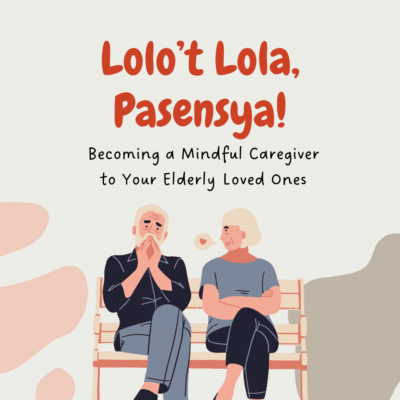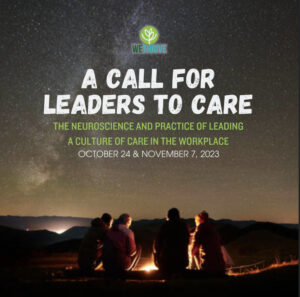“Itao mo nga ‘ka ko ro tubig, Mi– ayy… Joshua!” [in Kinaray-a]
(“Can you please pass the water, Mi- ayyy… Joshua!?”)
“Ayy, pasensya na nakalimutan kong idaan yung tubig kanina.”(“Ayy, apologies, I forgot to [have the store refill the water] earlier.”)
I’ve heard my grandparents say these things in different variations and in many situations. In my experience thus far, my grandparents tend to forget about what to say next, where they placed their own belongings, or even remembering a conversation that ended just hours before. The funniest thing I’ve encountered is when my lola would mistake my name for a different family member’s. I’ve been called “Miggy” (my older brother), “Gaby” (my female cousin), “Jojo” (my uncle) or some other name. Others may find this annoying, but I fully understand.
At a certain age, it is no surprise that there are things that the elderly in our families can no longer do, at least the way they used to when they were younger. We can easily overlook this fact because we may have our own things going on for us – work, school, personal lives, stress, responsibilities, goals, you name it. But for most, if not all, of us, we may be placed in the position or an expectation to provide support and care for our elderly loved ones at home.
How does aging affect us in late adulthood?
Aging is a natural process in our lives. It involves a considerable amount of changes that occur in ourselves in different aspects such as: changes in the body, our cognitive abilities, our emotional experiences, our social life, and our overall lifestyle.
Particularly, for our lolos, lolas, and all our other elderly loved ones – like, partners, relatives, friends, peers, and colleagues – these changes can look like (DiLonardo, 2023):
- Cognitive functions are not as sharp as before. You may notice that lolo and lola may sometimes have bouts of forgetfulness, like where they put their belongings or what day of the week it is. They may also have moments when they have tip-of-the-tongue instances as they talk. Perhaps, they may have trouble learning or remembering pieces of information, like what was said in a conversation or what they heard from the TV. Whatever the case, their abilities to process, store, and retrieve information may be impaired or declined compared to their younger selves. However, while memory and cognitive abilities may not be as sharp, it is not to say that we cannot provide them with tools to optimize and mitigate the decline of these functions.
- Their physical health may be more prone to illness. Because our bodily and organ functions naturally change over time, there is an increased tendency for sickness and other medical conditions. For example, the common health concerns among the elderly include cardiovascular concerns, like changes in blood pressure or in blood sugar levels. We may even notice that they might need to have more check-ups with their doctors, or have medications that they regularly intake, especially when it comes to maintaining their health optimally.
- Their bodily functions and movements may be different than before. Some bodily movements may not be the same as they were. They may have trouble maintaining their balance and gait, or carrying heavier objects is much more difficult. Perhaps, their eyesight and hearing is much weaker. Or that once active lifestyle, like working, traveling, or playing sports, may not be so active anymore. Whatever the case, the body tends to gradually slow down into lesser intensities or frequencies of activity at an old age.
- Maintaining relationships with their loved ones, friends, and peers. At late adulthood, we can expect that there will be changes to how their social spheres are like. They may have maintained some connections with lifelong friends and peers, while other connections may have been cut off or inactive. They may also experience frequent losses, like death of a loved one or friend, but perhaps some gains are there too. At late adulthood, we tend to seek value in the relationships we have maintained, as well as the emotional experiences that come along with it.
- And lastly, they focus on embracing and appreciating what time they perceive to have left. It may not be expressed explicitly for some, but late adulthood often entails a change in priorities of what experiences we prefer to go through and how we make sense of them. Longstanding research works have shown that as we age, our goals and priorities shift from wanting to explore, gain knowledge, and grow to wanting to find emotional meaning behind our experiences.
We may not notice these changes right away, but there will be certain points that become critical for us to mindfully pay attention to when and how they unfold. Some impacts of these changes could be negative, some positive, and even some neutral. But, the next step to noticing these changes is to maintain whatever positive aspects in an elderly’s life and, more importantly, manage the negative ones.
What challenges does aging bring to the elderly and their families?
Because of these multifactorial changes in the lives of the elderly, we can keep in mind that there are things that challenge our elderly loved ones in this stage of their lives. Some common examples of these are (Rodriguez, 2022):
- Basic tasks and activities for daily living become much more difficult to do independently.
- Taking care of one’s health and wellbeing can become challenging, overwhelming, or stressful.
- Managing one’s own responsibilities, roles, and contributions to the family is a lot more exhausting or difficult than before.
- Not being able to do any pleasurable activities as frequently or intensely as they were once were engaged in.
- Becoming easily irritable, agitated, or worried, perhaps with the smallest of things (e.g., having a clean house) or bigger ones (e.g., their health or illness).
- Having tendencies to feel left out, misunderstood, lonely, isolated, or a “burden” to others, which may cause tensions and rifts in their relationships (i.e., in the family).
This is why it is important to provide them with support and care in dealing with these challenges and difficulties. Whether or not we are motivated by our values, culture, and our familial roles, it is important for us to recognize what influences us to care for our elderly. We can keep in mind that these values could help us understand and appreciate the changes and the lived experiences of our elderly loved ones – which is an essential step to providing genuine care.
What gets in the way of caring for my elderly loved one?
Caring for an elderly loved one can be challenging for the caregivers at times. You may notice that there were moments that your lolo or lola asked for something from you suddenly, especially when you’re not prepared for it. Or perhaps you also found it difficult to fulfill that request because it was too difficult or was not possible at the moment.
It is helpful to acknowledge that, in these situations, there are factors that are within your control that can help facilitate providing care more effectively for your elderly loved ones. But there are also barriers that may get in the way of these. And so, what are these?
- We don’t have enough resources, skills, and support to provide care for the elderly. (e.g., not knowing what to say or do in return when they’re unexpectedly upset, etc.)
- We have negative biases and assumptions about the elderly. (e.g., “Kapag matanda, mahirap umintindi.”, feelings of helplessness, etc.)
- We’re unaware of how our emotional responses to the elderly affect us and them altogether. (e.g., lashing out instead of calmly responding to their requests, etc.)
- We have unmet needs that get in the way of attending to another’s needs. (e.g., needing rest after a long day of work, etc.)
- We do not remind ourselves of our own limits and boundaries as a person. (e.g., giving all our time and energy to providing care to them; not allowing time for self-care and recreation, etc.)
When these barriers are present, it becomes more difficult for us to attune and respond to our elderly loved one’s needs. Sometimes it can cause a strain into our relationship with them, which can perpetuate tension and emotional distress (Perez et al., 2022). This is what we call compassion fatigue. When we don’t pay attention to these barriers, compassion fatigue can show up as:
- Having frequent arguments or disagreements with our elderly loved ones;
- Become less patient or unforgiving towards their behaviors and attitudes;
- Neglect roles or responsibilities we committed to them and ourselves as a family member;
- Automatically labeling their needs as a burden rather than seeing something valid in them;
- Being critical about ourselves and who we are as caregivers or family members;
- Becoming tired or burned out, or even neglecting our own personal needs.
Pause, step back, and observe
How can we manage and remove these barriers towards caring for our elderly? One of the best ways we can explore and answer these questions is to apply a bit of mindfulness – which is the capacity to notice our thoughts and feelings without judgment – in our approach. Try this out:
- Pay attention to your emotional and bodily response. Notice what parts of you feel tense and relaxed.
- Take a deep breath, and mentally step back from the situation. Notice what thoughts were factual (ex. “Lola, needs me to lift up the laundry basket.”) and what were judgments (ex. “Lola is being loud and annoying.”).
- For the factual thoughts, ask and briefly answer: “What is being asked of me? And how can I provide that with the resources and energy I have right now?”
- For the judgments, ask and briefly answer: “Where is this coming from? What barriers are up right now and what can I do about them?”
- After reflecting on these questions, apply mindfulness – which is just noticing your thoughts and feelings without judgment. Then, decide on the best course of action to respond to your lolo or lola’s needs, ex. “Which actions will make it better or worse?”: “What actions can improve or worsen the situation?”
You may not get the hang of it right away – and that’s okay! Constantly and mindfully practicing this skill can help you navigate through caregiving decisions, especially when they become immediate, unexpected, or stressful (Perez et al., 2022). What’s just as important is that you remind yourself why you care for your lolo and lola and help yourself find a way to take down your barriers.
Adopting a lovingkindness approach to our elderly loved ones
In many studies, it has proven mindfulness has improved outcomes for both the elderly, who receive care, and the caregiver. Constant practice of mindfulness that incorporates a sense of compassion, kindness, and gratitude has shown to reduce compassion fatigue and create a nonjudgmental space for us to explore our own emotional and behavioral responses towards our elderly loved ones. In this way, we can cultivate within ourselves a sense of lovingkindness, or the feeling of tenderness and consideration towards other people – not just towards our lolos and lolas – but to ourselves as well (Hoffman, Grossman, & Hinton, 2011). We can learn to validate that our relationship with our elderly loved ones holds space for all of our needs – because, as caregivers, we have them too.
So try this. Whenever you are in a tough situation or having difficulties attuning to your elderly’s needs, say these to yourself as a reminder:
May I be safe.
May I be well.
May I be happy.
May I be loved.
Likewise, we can remind ourselves about the care we are capable of giving to our lolos and lolas:
May they be safe.
May they be well.
May they be happy.
May they be loved.
Ultimately, the best kind of care we can give to them is a sense that, despite the imperfections and challenges of caregiving, we can look towards ourselves and to them as humans who deserve safety, wellness, and compassion.
—
References
- Carstensen, L. & Hershfield, H. (2021). Beyond stereotypes: Using socioemotional selectivity theory to improve messaging to older adults. Current Direction in Psychological Science, 30(4), 327-334. doi:10.1177/09637214211011468. [Retrieved from
- https://www.ncbi.nlm.nih.gov/pmc/articles/PMC8340497/]
- DiLornado, M. (2023). Caregiving for older adults. WebMD. Retrieved from https://www.webmd.com/healthy-aging/aging-caregiving-older-adults.
- Hofmann, S. G., Grossman, P., & Hinton, D. E. (2011). Loving-kindness and compassion meditation: Potential for psychological interventions. Clinical Psychology Review, 31(7), 1126-1132. doi: 10.1016/j.cpr.2011.07.003
- Pérez, V., Menéndez-Crispín, E. J., Sarabia-Cobo, C., de Lorena, P., Fernández-Rodríguez, A., & González-Vaca, J. (2022). Mindfulness-based intervention for the reduction of compassion fatigue and burnout in nurse caregivers of institutionalized older persons with dementia: a randomized controlled trial. International Journal of Environmental Research and Public Health, 19(18), 11441. 1441. doi:10.3390/ijerph191811441
- Rodriguez, J. (2022). What are the problems faced by elderly in our society?. GrisWorld. Retrieved from https://www.griswoldhomecare.com/blog/2022/december/what-are-the-problems-faced-by-elderly-in-our-so/




